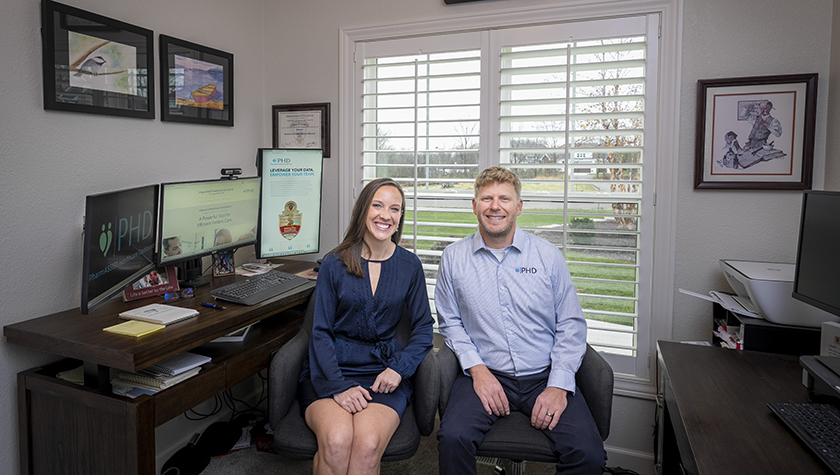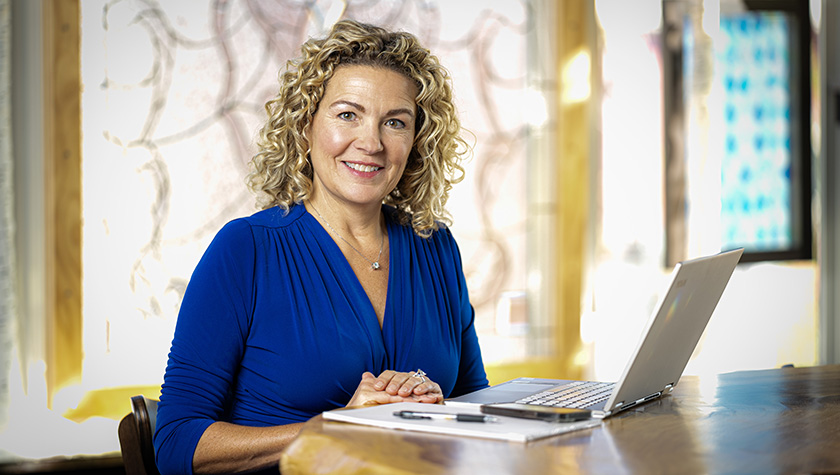
After meeting at the UW–Madison School of Pharmacy, alumni Jesse and Jessica Schaetzel are now helping healthcare workers across the country harness the power of data
By Archer Parquette
Say you’re a pharmacist with a clinical intervention you believe could help certain patients — for example, a targeted intervention for diabetic patients with an elevated A1C and certain comorbidities.
If a health care system or organization presents you with a scattershot list of 10,000 people to potentially target, it would take a long time to reach the right patients. With the help of a data dashboard, you could figure out the 100 patients in that group who would most benefit from the intervention and then target them instead of casting such a wide net.
“Wouldn’t that be much easier?” says Jesse Schaetzel (PharmD ’06). “It’s really focusing limited resources to get the most efficiency out of health care.”
“There are billions of data points being collected, but the question is how do you use all that data to help you do your job better?”
—Jesse Schaetzel
That’s what spurred him and his wife, Jessica Schaetzel (PharmD ’06) to launch their own business: PharmASSIST Healthcare Dashboards, which provides dashboard solutions, data analytics, and consulting services to organizations across the country.
The ‘aha’ moment
Entrepreneurship was not on the radar for Jesse and Jessica Schaetzel, who met during their second year of the PharmD program at the University of Wisconsin-Madison School of Pharmacy and married in 2008, two years after their graduation.
Jessica went into geriatric and assisted living pharmacy, while Jesse pursued population health, working for health care systems. In 2020, Jesse’s work sparked the idea that would become the couples’ business.
“Data reporting is always an issue in health care,” Jesse says. “Whether you’re at a small organization or a large one, everybody wants data. Typically, what happens is you make your data request, get put into a line, and they say ‘Here’s our queue of 10,000 requests. You’re number 9,000.’ And then even after you get the data you need, you often have to lean on someone else to show you what you want to see and how you want it presented. I thought, ‘Why can’t we just do this on our own?’”

In his free time, Jesse, who is the manager of pharmacy for population health at Advocate Aurora Health in Milwaukee, Wisconsin, began thinking about more efficient ways to access the numbers and analysis he needed.
“Health care data is abundant. A lot of organizations use electronic health records, medication administration records, retail pharmacy records,” he says. “There are billions of data points being collected, but the question is how do you use all that data to help you do your job better?”
“Jesse sat down and said, ‘I’m just going to figure this out and do it,’ says Jessica, who at the time was a long-term care pharmacist with Genoa Healthcare.
He created a computer dashboard that sorted through raw data and presented him with numbers, trends, and analysis in an easy-to-access and understand visualization. If he needed to figure out a trend among patients of a certain population, he could just input that and see the latest numbers.
“He made it accurate, made it efficient, made it make sense to health care,” says Jessica. “That was an ‘aha’ moment for us.”
Insights to enhance care
The couple realized that the dashboard Jesse had created wasn’t just a useful solution for him. Hundreds of organizations could benefit from better, simpler data analysis.
They decided that they could turn this into a business and try to pitch the data solution dashboard to health care organizations. While Jesse fine-tuned the technology, Jessica, who also co-owns Cedar Creek Apothecary in Cedarburg, Wisconsin, stepped back from her role as a long-term care pharmacist to spearhead the business side of things.
“It was a lot of long nights and weekends,” Jesse says.
The couple, who have two sons ages 11 and 13, had no experience in the world of tech startups, and Jessica spent much of her free time figuring out the ins and outs of the industry.

“Pharmacists by nature are detail-oriented, risk-averse, and perfectionists at heart,” she says. “My mantra through these last years has been, ‘Don’t let the perfect be the enemy of the good.’ My advice to people who are interested in betting on themselves and starting a business is this — just start.”
In 2023, Jessica and Jesse officially founded PharmASSIST Healthcare Dashboards and quickly started building a client base — both pharmacies and other health care organizations. One of their main selling points was the customizability of the dashboard. Before digging into the data, the couple works closely with each client to determine their goals and needs.
One community pharmacy uses PharmASSIST to analyze its revenue streams — Medicare, Medicaid, and commercial — and make decisions about allocating resources and finding new opportunities. A government client is working with PharmASSIST to examine statewide opioid prescription data to better understand how to curb misuse and overdose. A client in Kentucky is compiling community pharmacy data to see how those smaller pharmacies might be able to contribute to addiction treatment. And recently, an assisted living community has started looking at ways a dashboard can help them better understand the needs of its residents and care teams.
Once those goals are determined, Jesse and Jessica take the organization’s raw data and turn it into a dashboard. The accessible software visualizes the numbers and allows the organization to manipulate it and easily find the trends and points they need.
“We ingest any healthcare data — EHR, pharmacy claims, insurance claims, call logs, anything with identifiable data points — and transform it into a highly functional integrative dashboard with customized metrics built behind the scenes,” says Jessica. “The world is your oyster once you start visualizing your data: efficiencies, cost savings, value stories, quality assurances, monitoring… the list goes on.”
Expanding horizons
PharmASSIST’s first major milestone was the HIMSS Global Health Conference and Exhibition in Chicago in April 2023 — an annual gathering of entrepreneurs in tech and health care.
“We started off at the conference feeling like we were out of our league,” says Jessica. “But then we talked to people in the tech industry who want to get into health care, and we realized that they need us. We know health care. It was an empowering moment.”
“Pharmacists by nature are detail-oriented, risk-averse, and perfectionists at heart.”
—Jessica Schaetzel
PharmASSIST’s early users have found success with it, and their Opioid Stewardship Solution was even selected as a quarterfinalist for the 2024 Digital Health Hub Foundation’s Digital Health Awards, as a rising star in the Mental and Behavioral Health category.
Now the couple is looking to grow, to bring the dashboard to more organizations and to find new uses for the analytical tool.
“Everybody in health care is always trying to do more with less,” Jessica says. “From the leadership side, being able to identify efficiencies and better ways to care for people is something that can change health care, and ultimately make it easier on our health care workers.”
Connect on LinkedIn
Connect on LinkedIn

